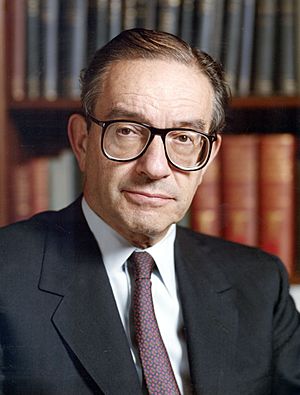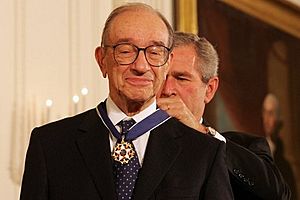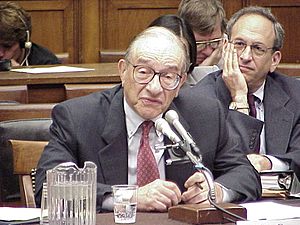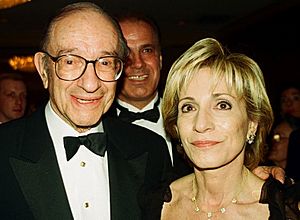Alan Greenspan facts for kids
Quick facts for kids
Alan Greenspan
|
|
|---|---|
 |
|
| 13th Chairman of the Federal Reserve | |
| In office August 11, 1987 – January 31, 2006 |
|
| President | |
| Deputy |
|
| Preceded by | Paul Volcker |
| Succeeded by | Ben Bernanke |
| Member of the Federal Reserve Board of Governors | |
| In office August 11, 1987 – January 31, 2006 |
|
| President |
|
| Preceded by | Paul Volcker |
| Succeeded by | Ben Bernanke |
| 10th Chairman of the Council of Economic Advisers | |
| In office September 4, 1974 – January 20, 1977 |
|
| President | Gerald Ford |
| Preceded by | Herbert Stein |
| Succeeded by | Charles Schultze |
| Personal details | |
| Born | March 6, 1926 New York City, U.S. |
| Political party | Republican |
| Spouses | |
| Education | |
| Scientific career | |
| Fields | Economic theory; Economics |
| Thesis | Papers on economic theory and policy (1977) |
Alan Greenspan (born March 6, 1926) is an American economist. He was the 13th chairman of the Federal Reserve from 1987 to 2006. The Federal Reserve is like the central bank of the United States. It helps manage the country's money and economy.
President Ronald Reagan first chose Greenspan for the Federal Reserve in August 1987. He was chosen again every four years until he retired on January 31, 2006. He held the job for almost 19 years, which was the second-longest time anyone had served in that role. After he left, President George W. Bush picked Ben Bernanke to take his place.
Before working at the Federal Reserve, Greenspan was a consultant. Even though he was quiet in public, the media often praised him. Some people even called him a "rock star" because he was so well-known. However, some leaders in Congress criticized him. They felt he was mixing politics with his job, especially because he supported certain tax cuts and changes to Social Security.
Some people believe that the Federal Reserve's policies under Greenspan, which made it easier to borrow money, contributed to economic problems. These included the "dot-com bubble" (when internet company stocks crashed) and the "subprime mortgage crisis" (a housing market problem that happened shortly after he left). Economist Robert Shiller suggested that when stocks fell, people started investing a lot in real estate, which led to problems. Greenspan, however, argued that the housing bubble was not caused by low interest rates in the U.S. He thought it was a worldwide issue linked to how much people saved in different countries.
Contents
Early Life and Education
Alan Greenspan was born on March 6, 1926, in New York City. His father was of Romanian Jewish background, and his mother was of Hungarian Jewish background. After his parents divorced, Alan grew up with his mother and his grandparents. His father worked as a stockbroker.
Greenspan went to George Washington High School from 1940 to 1943. He was good at music and played the clarinet and saxophone. He even studied clarinet at the Juilliard School for a year. In 1945, he started studying economics at New York University. He earned his first degree in economics in 1948 and a master's degree in 1950. He also studied at Columbia University but stopped because he was too busy with work.
In 1977, Greenspan earned his Ph.D. in economics from New York University. His Ph.D. paper was removed from the university at his request in 1987 when he became chairman of the Federal Reserve. However, a copy was found later. It talked about rising housing prices and how they affect what people spend. It even predicted a housing bubble might burst.
Career Highlights
Before Leading the Federal Reserve
While studying economics, Greenspan worked at an investment bank called Brown Brothers Harriman. From 1948 to 1953, he was an analyst at the National Industrial Conference Board, a group that studies business and industry.
From 1955 to 1987, Greenspan led his own economics consulting company, Townsend-Greenspan & Co., Inc. He took a break from his company from 1974 to 1977. During this time, he worked for President Gerald Ford as the chairman of the Council of Economic Advisers. This council gives advice to the President on economic matters.
Greenspan also served on the boards of several large companies, including Alcoa, General Foods, and Mobil Corporation. He was also part of the Council on Foreign Relations, which is a foreign policy group.
Leading the Federal Reserve
| What I've learned at the Federal Reserve is a new language which is called "Fed-speak". You soon learn to mumble with great incoherence. |
| — Alan Greenspan |
On June 2, 1987, President Ronald Reagan chose Alan Greenspan to be the chairman of the Federal Reserve. The Senate approved him on August 11, 1987.
Soon after he started, the stock market crashed in October 1987, an event known as "Black Monday." Greenspan quickly announced that the Federal Reserve was ready to help the economy. This action became known as the "Greenspan put." President Bill Clinton later chose Greenspan to continue as chairman and often asked for his advice on the economy. Greenspan supported Clinton's plan in 1993 to reduce the government's debt.
In 2000, Greenspan raised interest rates several times. Many people believe these actions caused the "dot-com bubble" to burst. This was when the prices of many internet company stocks fell sharply. However, some economists, like Nobel Prize winner Paul Krugman, argued that Greenspan waited too long to act.
After the September 11 attacks in 2001 and some company scandals, the Federal Reserve, led by Greenspan, cut interest rates. This brought the federal funds rate down to 1% by 2004. In 2002, he said that people are not more greedy than in the past, but there are now more ways for greed to show up. He suggested that financial markets needed more rules. Some critics, like Steve Forbes, believed Greenspan's policies caused prices of goods and gold to rise too much.
Greenspan advised President George W. Bush's team to remove Saddam Hussein from power in Iraq. He believed that even a small problem with oil supplies could cause high oil prices and "chaos" in the world economy. He worried that Saddam could control important oil shipping routes.
On May 18, 2004, President George W. Bush nominated Greenspan for an amazing fifth term as chairman of the Federal Reserve. He had already been appointed by Presidents Reagan, George H. W. Bush, and Bill Clinton.
In 2005, Greenspan talked about how new financial tools, called "derivatives," helped banks handle risks better. But he also worried about the risks these tools could create if too many were concentrated in certain markets.
Greenspan was against putting extra taxes (tariffs) on goods from China. He thought that American workers affected by trade with China should get help through unemployment benefits and job training programs instead.
Greenspan's time as a member of the Federal Reserve board ended on January 31, 2006. Ben Bernanke became his successor. Greenspan did not give any TV interviews during his time as chairman from 1987 to 2005.
After Leaving the Federal Reserve
After leaving the Federal Reserve, Greenspan started his own economic consulting company, Greenspan Associates LLC. He also took an unpaid position with the government in the United Kingdom.
In February 2007, Greenspan predicted that the United States might face an economic slowdown, or recession, by early 2008. The next day, the stock market dropped significantly.
Greenspan also worked as an advisor for several financial companies, including Pacific Investment Management Company (PIMCO) and Deutsche Bank. In 2008, he became an advisor for a hedge fund called Paulson & Co. This company had predicted the housing market crash.
In 2009, Greenspan spoke to a U.S. Senate committee. He argued that the U.S. needed more skilled immigrants. He said that the number of special visas for skilled workers was "far too small." He believed more skilled workers were needed as older, experienced workers retired.
His Memoir
Greenspan wrote a book about his life and work called The Age of Turbulence: Adventures in a New World. It was published on September 17, 2007. He said he wrote most of the book by hand while soaking in the bathtub!
In his book, Greenspan talks about his time in government and his ideas about economics. He also discusses global economic issues. He criticized President George W. Bush and Vice President Dick Cheney for increasing government spending and debt. He felt they put politics before good economic choices. He wrote that they "deserved to lose" the 2006 election.
Greenspan praised President Bill Clinton the most among the presidents he worked for. He admired Clinton's focus on long-term economic growth. He found President Richard Nixon to be very smart but also "paranoid." He said President Gerald Ford was "as close to normal as you get in a president." For the future of the U.S. economy, Greenspan suggested improving schools. He believed this would help reduce the gap between high-income earners and other workers.
Objectivism
In the 1950s, Greenspan became friends with the writer and philosopher Ayn Rand. Rand had a philosophy called Objectivism. Greenspan was introduced to her by his first wife. Rand gave Greenspan the nickname "the undertaker" because he often wore dark clothes and was quiet.
Greenspan became a strong supporter of Rand's ideas. He wrote articles for Objectivist newsletters and contributed essays to Rand's 1966 book Capitalism: The Unknown Ideal. In this book, he wrote an essay supporting the gold standard, which is a system where a country's money is backed by gold. Greenspan and Rand remained friends until she passed away in 1982.
Some people have criticized Greenspan, saying his actions at the Federal Reserve did not always follow the free-market ideas of Objectivism. Greenspan explained that in a democracy, people have to make compromises. He said he had to make compromises too, even though he believed the country did very well without a central bank and with a gold standard in the past. In 2008, he admitted that his belief in free markets without certain rules had some flaws. However, he still believed that free-market capitalism was the best system in a democracy. He said that mistakes came from how competitive markets were applied, not from the idea itself.
Personal Life
Greenspan has been married twice. His first marriage was to artist Joan Mitchell in 1952, but it ended after 10 months. In the late 1970s, he dated news reporter Barbara Walters. In December 1984, Greenspan started dating journalist Andrea Mitchell. They were married in April 1997 by Supreme Court Justice Ruth Bader Ginsburg.
Honors and Awards

Alan Greenspan has received many awards and honors for his work:
 He received the Presidential Medal of Freedom in November 2005. This is the highest award a civilian can receive in the United States.
He received the Presidential Medal of Freedom in November 2005. This is the highest award a civilian can receive in the United States. He received the Department of Defense Medal for Distinguished Public Service in January 2006.
He received the Department of Defense Medal for Distinguished Public Service in January 2006. He was made a Commander of the Legion of Honour by France in 2000.
He was made a Commander of the Legion of Honour by France in 2000. He received an honorary knighthood from Queen Elizabeth II in 2002, making him a Knight Commander of the Order of the British Empire in the United Kingdom.
He received an honorary knighthood from Queen Elizabeth II in 2002, making him a Knight Commander of the Order of the British Empire in the United Kingdom.
In 1976, he received the U.S. Senator John Heinz Award for Public Service. In 1989, he was chosen as a fellow of the American Statistical Association. He was also elected to the American Philosophical Society in 2000.
He received the Dwight D. Eisenhower Medal for Leadership and Service in 2004. In 2005, he was the first person to receive the Harry S. Truman Medal for Economic Policy. In 2007, he received the Thomas Jefferson Foundation Medal in Citizen Leadership. In 2012, he received the Eugene J. Keogh Award for Distinguished Public Service from New York University.
Honorary Degrees
Greenspan has also received several honorary degrees from universities:
| Location | Date | School | Degree | Gave Commencement Address |
|---|---|---|---|---|
| May 21, 1995 | University of Notre Dame | Doctor of Laws (LL.D) | ||
| 1998 | University of Pennsylvania | Doctor of Laws (LL.D) | ||
| June 10, 1999 | Harvard University | Doctor of Laws (LL.D) | Yes | |
| 1999 | Yale University | Doctor of Humane Letters (DHL) | ||
| 2005 | University of Edinburgh | Doctorate | ||
| December 14, 2005 | New York University | Doctor of Commercial Science |
Books by Alan Greenspan
- 1993 Monetary Policy Objectives: midyear review of the Federal Reserve Board (1993)
- William Taylor Memorial Lectures 3: Global Risk Management (1996)
- The Quotations of Chairman Greenspan: Words from the Man Who Can Shake the World (2000)
- The Age of Turbulence: Adventures in a New World (2007)
- Finance and Economics Discussion Series: Sources and Uses of Equity Extracted from Homes (2013)
- Finance and Economics Discussion Series: Estimates of Home Mortgage Originations, Repayments, and Debt on One-to-Four-Family Residences (2013)
- The Map and the Territory: Risk, Human Nature, and the Future of Forecasting (2013)
- The Map and the Territory 2.0: Risk, Human Nature, and the Future of Forecasting (2014)
- Finance and Economics Discussion Series: Motor Vehicle Stocks, Scrappage, and Sales (2015)
- Capitalism in America: A History (2018)
See also
 In Spanish: Alan Greenspan para niños
In Spanish: Alan Greenspan para niños
- List of United States political appointments across party lines
- Fedspeak
- Irrational exuberance
- Greenspan Commission
 | Valerie Thomas |
 | Frederick McKinley Jones |
 | George Edward Alcorn Jr. |
 | Thomas Mensah |



